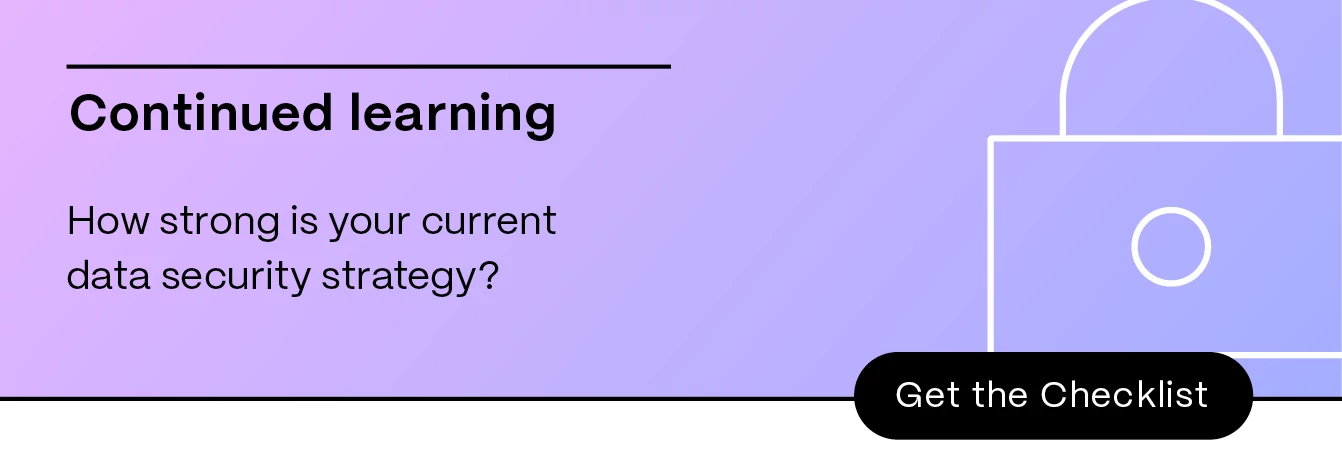
Blog
How secure is cloud storage? Top questions answered

The cloud offers a convenient way to store, manage, and access data from anywhere. Unlike traditional storage on a hard drive, it doesn’t rely on a single computer. Instead, it moves between computers and storage devices in large industrial facilities.
The use of cloud storage was already common by the mid-2000s, but in recent years, it’s become even more widespread. In financial services, 98% of organizations were using some form of cloud computing in 2023, up seven percent from 2020. Enterprise spending on cloud infrastructure amounted to $270 billion in 2023, a $45 billion increase compared to the previous year.
Cloud storage is more efficient and can offer greater security than traditional hard drives, but that doesn’t mean it’s completely secure. It’s important for businesses to understand cloud storage risks and steps to mitigate them. This Q&A-style guide provides an in-depth understanding of how secure this storage method actually is.
Understanding cloud storage and security
You may already use it for work or personal projects, but how secure is cloud storage? In this section, we answer some of the most common questions about cloud storage security.
What is cloud storage and how does it work?
Cloud storage is a way to store digital files using a third party server. It’s a service model where data is managed remotely and made available to users over the internet.
Here’s how it works: a cloud service provider grants the ability to store files on their remote servers. These files can then be accessed, managed, and shared through web-based interfaces. Users can save local storage space on their own computers and access data from anywhere with an internet connection.
What is cloud based storage security?
Cloud-based storage security is the practice of protecting cloud data from unauthorized access through processes and technology solutions.
As previously mentioned, the cloud doesn’t store data on any one computer. It’s decentralized and distributed across multiple servers and locations managed by the service provider. These remote access capabilities make it an excellent tool for team collaboration from any device and location.
Cloud storage is generally more secure than traditional storage because it uses encryption. It’s also more secure because storing data in multiple places protects it when part of a system is compromised. Despite this, cloud storage can face security risks such as unauthorized access and data breaches. Be sure your cloud storage solution has security features like end-to-end encryption, multi-factor authentication, and access controls.
Related read: Great security doesn't have to get in the way of a great user experience
Why is cloud storage security important?
Protecting sensitive information and data that’s stored in the cloud from unauthorized access and cyberattacks is a must. Cybercrime is on the rise with the number of reported data breaches increasingby 78% between 2022 and 2023.
Robust security helps safeguard sensitive client and company information. Without taking proper security measures for data stored in the cloud, you may face consequences such as:
- Data theft
- Financial losses
- Reputational damage
- Legal liabilities
- Operational disruptions
Can cloud storage be hacked?
From weak passwords, misconfigured security settings, and successful phishing and other cyberattacks — data stored in the cloud is at risk of being hacked. This isn’t just theoretical — 45% of today’s data breaches are cloud based. Apple’s iCloud incident in 2014 was especially memorable, as hackers targeted celebrities, stealing hundreds of private photos and posting those online. The hackers' success demonstrates the value of using two-factor authentication (2FA), requiring users to verify their identity on a separate device when logging into accounts.
Aside from 2FA, several security measures can reduce the risk of hacking to enhance cloud storage data security, including:
- Strong passwords: Create complex, unique passwords and change them regularly.
- Data encryption: Encrypt data both in transit and at rest with 256-bit encryption to protect it from unauthorized access.
- Access controls: Implement strict controls and permissions to ensure only authorized users can access sensitive data.

Is cloud storage 100% safe?
Even with robust security measures, there is always a risk of sophisticated cyberattacks, insider threats, and unforeseen issues. To maximize security, adopt the measures outlined above, as well as the following best practices:
- Regular security training: Educate staff on the latest cybersecurity threats and how to address them.
- Comprehensive security policies: Develop and enforce security policies detailing procedures for access controls, data handling, and incident responses.
- Regular security audits: Conduct periodic security assessments and audits to identify and address vulnerabilities.
Related read: 5 tips to securely share public links
What are 3 disadvantages of cloud storage?
While cloud storage has many advantages, we must consider cloud storage security issues. Here are the top three disadvantages of using cloud storage.
1. Data breaches and unauthorized access
According to an IBM report, 82% of breaches in 2023 involved data stored in the cloud. These breaches cost a staggering $4.45 million globally, increasing by 15% in just three years.
As we’ve pointed out earlier in this guide, cybercrime is prevalent. With more people using cloud storage, it makes sense that more hackers are trying to access these systems. It’s important to acknowledge that even with stringent security measures, cloud data may be stolen.
2. Dependence on internet connectivity
Cloud storage relies on the internet for access, which can lead to issues. For example:
- Downtime during internet outages
- Reduced performance with slow or unreliable connections
- Accessibility issues without internet access
3. Potential downtime and service disruptions
Cloud storage service outages can disrupt data access. This prevents users from retrieving or storing information and hinders productivity. Without contingency plans, such as local backups, you may face delayed project timelines and financial losses.
What is encryption and how does it protect cloud data?
Encryption converts data into a coded format that can only be accessed by authorized users with the decryption key. It plays a crucial role in cloud storage data protection, ensuring that information can’t be interpreted or used, even if unauthorized parties gain access.
How does multi-factor authentication (MFA) enhance security?
MFA is a security system that requires users to verify their identity through multiple forms of verification. 2FA, which we discussed earlier in this piece, is a type of MFA that requires two methods of identification. Businesses should always implement MFA for cloud storage systems to reduce the risk of breaches caused by stolen or weak passwords.
What are access controls and permissions in cloud storage security?
Access controls and permissions define who can access and alter specific files. These ensure only authorized users can view, modify, or delete information. Managing access and permissions is crucial as it reduces opportunities for cyber criminals to steal data.
Why are regular security audits important?
Regular audits help identify vulnerabilities, promote compliance with security policies, and verify the effectiveness of current security measures. By conducting regular audits for cloud storage security, businesses can proactively address weaknesses, mitigate risks, and stay ahead of potential threats.

Keep your documents safe with cloud based storage
Cloud storage is used regularly across industries because it stores data remotely and provides access from anywhere with an internet connection. While no solution is 100% secure, it’s a great option for managing files and assets.
With cybercrime incidents on the rise, protecting sensitive information is just as important as using a convenient data storage solution. Be sure to use professional cloud storage software with strong security features to lower the risk of cybersecurity incidents.
Related Resources

Blog